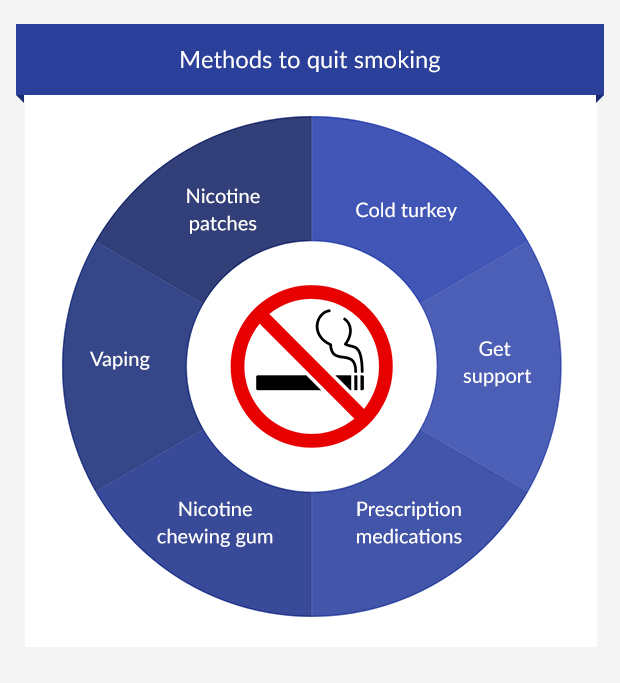Login to your account
- Prescription included
- Genuine medication
- All-inclusive service - No hidden fees
- Free next-day delivery
Stop Smoking
Get stop-smoking medication with an online prescription
With tobacco smoking being the leading cause of death globally, it’s not surprising that the majority of smokers want to quit.
But as many are aware, the addictive nature of smoking cigarettes makes it difficult to cut them out. A dependence on nicotine leaves users with strong cravings and other withdrawal symptoms.
Keep reading to learn about the different approaches to stopping smoking. With the right information, you may find a route to quitting that’s easier and more effective than relying on willpower alone.
Available Treatment(s)

- Clinically proven to be the most successful quit smoking method
- Quadruples your chances of quitting smoking
- Prevents withdrawal symptoms of not smoking

- Effective stop-smoking treatment
- Starts working from week 2
- Only available prescription quit-smoking aid

- Effectively reduces cravings
- Blocks nicotine receptors
- Helps you quit for good
Why is smoking bad for you?
Smoking is a widely publicised habit that only has negative effects. More than 8 million people die every year from tobacco smoking, making it the largest cause of preventable death globally.
Cigarettes contain harmful and addictive chemicals including tar, carbon monoxide and nicotine. Smoking tobacco products can cause:
- lung cancer
- liver cancer
- throat and mouth cancer
- bladder cancer
- chronic obstructive pulmonary disease (COPD)
- heart disease and stroke
- diabetes
- infertility
- erectile dysfunction
- high blood pressure
Smoking can also affect the way you look. Examples of this are premature wrinkling and yellow teeth. The video below lists the different ways smoking can change your appearance.
Second-hand smoke also kills. Out of the 8 million deaths caused by smoking, it is estimated that roughly 1.7 million of these deaths are non-smokers who have been exposed to second-hand smoke.
What role does nicotine play?
Nicotine is the chemical contained in tobacco that makes smoking so addictive. Nicotine addiction is harmful in many ways because it:
- causes you to crave cigarettes and makes you dependent on them
- alters your brain chemistry, making you perceive smoking as good instead of bad
- releases a happy, ‘feel-good’ hormone called dopamine
By feeling a rush of dopamine each time you smoke, you may come to believe that cigarettes help you unwind and cope with stress. However, smoking actually increases stress and tension in the body, rather than alleviating it.
Nicotine withdrawals
Nicotine withdrawals are one of the reasons that smoking is so hard to quit. When you stop smoking cigarettes, people experience the following symptoms:
- having an intense urge or craving to smoke
- feeling irritable or agitated
- restlessness, or inability to stay comfortably still
- poor concentration
- poor sleep quality
- increased hunger
While challenging, it’s entirely possible to get through the initial stages of nicotine withdrawal. Stay busy and try to distract yourself whenever you feel yourself reaching for a cigarette.
What are the benefits of stopping smoking?
Smoking endangers your own health as well as the health of those around you. Quitting comes with the following short-term health benefits:
| Physical benefits | Mental benefits |
|---|---|
|
|
In the long term, your chances of developing life-threatening conditions dramatically decrease.
What happens when you quit smoking

- after 1 year, your chance of having a heart attack is reduced by 50% compared to a smoker
- after 10 years, your chance of developing lung cancer is reduced by 50% compared to a smoker
- after 15 years, your chance of having a heart attack falls to the same as somebody who has never smoked before
How do I stop smoking?
There are several different ways you can help yourself quit. You might have to try multiple options before finding what works well for you.

Nicotine replacement therapy (NRT)
Nicotine replacement therapy provides low-level doses of nicotine to people who are trying to stop smoking.
It helps you quit smoking by tackling nicotine cravings, the addictive chemical contained in cigarettes and other tobacco products. It is designed to help ween you off gradually and reduce withdrawals.
Nicotine replacement therapy comes in the form of:
- chewing gum
- skin patches
- nasal sprays
- lozenges
- inhalers
Your starting dose will depend on how much you’ve been smoking daily. As time goes on, you slowly reduce the nicotine dose with the aim of no longer being reliant on it.
Please note: You mustn’t use nicotine replacement therapy while continuing to smoke. This can cause nicotine to reach toxic levels in your system.
Vaping
Vapes (or E-cigarettes) are electronic devices that allow you to inhale nicotine without smoke. This method can replicate the feeling of smoking cigarettes without the carcinogenic chemicals and tar.
Vapes help to replicate the social element and hand-to-mouth action of smoking. This is more likely to stop you from returning to old habits, compared to nicotine patches or gum.
You can purchase E-liquids in multiple different strengths, depending on your needs. Over time, you should aim to decrease your nicotine dose until you no longer experience cravings.
Nicotine itself is not considered to be harmful and can effectively treat people who are trying to quit smoking.
Prescription medicines
Another effective method for quitting smoking is prescription medications. Products such as Champix and Zyban consist of daily pills that change the way your body reacts to nicotine.
Champix works by blocking the effects of nicotine in the body so that you don’t experience a rush of dopamine or a ‘rewarding feeling’ when you smoke.
Zyban also works by changing the way your brain responds to nicotine. This helps limit nicotine withdrawal symptoms and cravings, making it easier to quit.
Getting the right support
Getting support and having the right people around you thoroughly increases your chances of stopping smoking for good.
In addition to encouragement from friends and family, you can join support groups that keep you motivated and provide advice for when you slip up.
Having friends who are also trying to quit smoking can also act as a good source of motivation.
What else can I do to quit smoking?
Some lifestyle changes and tips may help you quit smoking, such as:
- decide when to quit, create a plan and stick to it
- change your routine if you’re used to smoking at certain times
- plan for situations where you usually smoke
- don’t give up - it usually takes people a few tries to quit for good
- keep your mind and your hands busy to distract yourself if you feel a craving
These tips alongside stop-smoking treatments will help you kick the habit.
Can I order stop-smoking treatment online?
Yes, you can purchase prescription medicines to stop smoking here at euroClinix. We currently offer Champix and Zyban, two kinds of tablets that drastically reduce nicotine cravings.
Simply fill out our online questionnaire to complete your consultation. Your information will be examined by one of our registered doctors, who will approve you for treatment if it is safe to do so.
Once approved, your order will be dispensed from our pharmacy and sent straight to your door in discreet, unbranded packaging.
Select
medicationFill out a short
medical formDoctor issues
prescriptionMedication sent
from pharmacy
